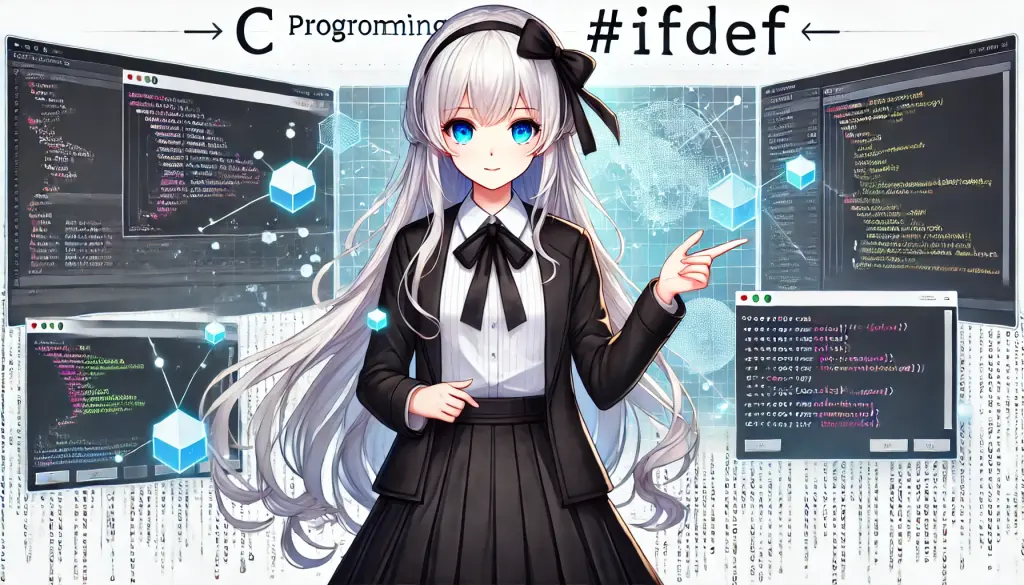- 1 1. Introduction
- 2 2. Basics of Preprocessors and Macros
- 3 3. Basic Syntax of #ifdef Directive
- 4 4. Main Use Cases of #ifdef
- 5 5. Difference Between #ifdef and #ifndef
- 6 6. Branching with Multiple Conditions
- 7 7. Tips and Best Practices for Using #ifdef
- 8 8. Frequently Asked Questions (FAQ)
- 9 9. Conclusion
1. Introduction
What is #ifdef in C Language?
In C, the #ifdef preprocessor directive is used for conditional compilation. It allows you to control whether certain parts of the program are compiled, making code management and maintenance easier. This feature is especially essential for large-scale projects and managing platform-dependent code.
Do you face these challenges?
- Want to easily switch code for different platforms.
- Need to manage debug-only code efficiently.
- Want to prevent errors caused by including the same header file multiple times.
What this article will help you solve
This article explains #ifdef in detail, from basic syntax to advanced examples. By learning the following, you’ll be able to fully control conditional compilation.
- Basic usage of the
#ifdefdirective. - How to switch platform-dependent or debug code.
- Preventing multiple definitions using include guards.
- Practical understanding through code examples.
- Key points and best practices.
This content is designed for both beginners and intermediate developers. We will explain step-by-step in the following sections.

2. Basics of Preprocessors and Macros
What is a Preprocessor?
The preprocessor is a mechanism that processes directives before the C compiler interprets the code. This enables efficient code management and conditional compilation. All preprocessor directives start with #, and common examples include:
#include: Import an external file.#define: Define a macro.#ifdef: Conditional compilation.
Basics of Macro Definitions
Macros are a convenient way to define constants or shorthand expressions used within code. They are defined using #define and can be called easily within the program.
Example: Defining Pi
#define PI 3.14159
printf("The value of Pi is %f\n", PI);In this code, the symbol PI is replaced with “3.14159.” Managing frequently used constants with macros improves readability and makes changes easier.
Benefits of Using Macros
- Improved Readability: Meaningful names make the code’s intent clearer.
- Easier Maintenance: Values can be changed in one place.
- Reduced Code Size: Simplifies repetitive code.
Note
Macros only perform simple text replacement; they do not perform type checks on arguments. Use them carefully to avoid bugs.
3. Basic Syntax of #ifdef Directive
Basic Syntax and Usage
#ifdef checks whether a specified macro is defined, and compiles the code only if the condition is true.
Example Syntax
#ifdef DEBUG
printf("Debug mode\n");
#endifIn this example, the printf function is compiled only if the macro DEBUG is defined. Otherwise, the code is ignored.
Roles of ifdef and endif
#ifdef: Activates code if the specified macro is defined.#endif: Marks the end of a conditional compilation block.
This pair allows you to conditionally enable or disable parts of your program.
Code Example: Controlling with Debug Flag
#define DEBUG
#ifdef DEBUG
printf("Debug info: No errors\n");
#endifHere, debug information is printed because DEBUG is defined. If you remove #define DEBUG, the debug code will not be compiled.
Benefits of Conditional Compilation
- Debug Management: Exclude debug code from production builds.
- Platform Support: Manage different code for different environments within one source file.
- Modularization: Toggle specific features for testing.
4. Main Use Cases of #ifdef
1. Include Guards
Include guards prevent a header file from being included multiple times. If the same header file is included more than once, duplicate symbol errors can occur. This can be avoided by using #ifndef with #define to create an include guard.
Code Example: Implementing an Include Guard
#ifndef HEADER_H
#define HEADER_H
void hello();
#endif2. Switching Platform-Dependent Code
You can easily switch code depending on the platform. For example, you can use #ifdef to change behavior between Windows and Linux.
Code Example: Switching Code by OS
#ifdef _WIN32
printf("Running on Windows\n");
#else
printf("Running on another environment\n");
#endif3. Controlling Debug Code
#ifdef is also useful for disabling debug code in production builds.
Code Example: Switching Debug Mode
#define DEBUG
#ifdef DEBUG
printf("Displaying debug information\n");
#else
printf("Production mode\n");
#endifSummary
These use cases make #ifdef an important feature for improving code readability and maintainability. Next, we’ll look at the difference between #ifdef and #ifndef.
5. Difference Between #ifdef and #ifndef
Comparison Table
| Directive | Description |
|---|---|
| #ifdef | Executes code if the specified macro is defined. |
| #ifndef | Executes code if the specified macro is not defined. |
Code Example: Using #ifdef
#define DEBUG
#ifdef DEBUG
printf("Debug mode\n");
#endifCode Example: Using #ifndef
#ifndef RELEASE
#define RELEASE
printf("Release mode\n");
#endifSummary of Differences
#ifdefruns the code if the macro is defined.#ifndefruns the code if the macro is not defined.
Key Point
Combining these directives allows for more flexible conditional branching. Next, we’ll discuss branching with multiple conditions.

6. Branching with Multiple Conditions
1. Using #if and #elif
The #if directive checks whether an expression evaluates to true and controls compilation accordingly. The #elif directive works like else if and checks additional conditions in sequence.
Code Example: Multiple Conditions
#if defined(WINDOWS)
printf("Running on Windows\n");
#elif defined(LINUX)
printf("Running on Linux\n");
#elif defined(MACOS)
printf("Running on MacOS\n");
#else
printf("Running on another environment\n");
#endif2. Using Logical Operators
You can also use logical operators with #if to write more complex conditions concisely.
Available Logical Operators
&&(AND): Executes if all conditions are true.||(OR): Executes if any condition is true.!(NOT): Negates a condition.
Code Example: Combining Multiple Conditions with Logical Operators
#if defined(WINDOWS) || defined(LINUX)
printf("This is a supported environment\n");
#else
printf("This is an unsupported environment\n");
#endif3. Branching Based on Macro Values
You can branch based on macro values, which is useful for implementing behavior depending on settings or version numbers.
Code Example: Numeric Comparison
#define VERSION 2
#if VERSION == 1
printf("Version 1\n");
#elif VERSION == 2
printf("Version 2\n");
#else
printf("Unsupported version\n");
#endifApplied Example
Code Example: Switching Between Debug and Release Builds
#if defined(DEBUG) && !defined(RELEASE)
printf("Debug mode\n");
#elif !defined(DEBUG) && defined(RELEASE)
printf("Release mode\n");
#else
printf("Configuration error\n");
#endifSummary
By combining multiple conditions and logical operators, you can achieve more flexible and advanced conditional compilation.
7. Tips and Best Practices for Using #ifdef
1. Important Considerations
1. Avoid Overcomplicating the Code
Excessive use of conditional compilation can make your code harder to understand. Be especially cautious with deeply nested #ifdef statements.
Bad Example: Overly Deep Nesting
#ifdef OS_WINDOWS
#ifdef DEBUG
printf("Windows Debug Mode\n");
#else
printf("Windows Release Mode\n");
#endif
#else
#ifdef DEBUG
printf("Other OS Debug Mode\n");
#else
printf("Other OS Release Mode\n");
#endif
#endifImproved Example: Simplified Conditions
#ifdef DEBUG
#ifdef OS_WINDOWS
printf("Windows Debug Mode\n");
#else
printf("Other OS Debug Mode\n");
#endif
#else
#ifdef OS_WINDOWS
printf("Windows Release Mode\n");
#else
printf("Other OS Release Mode\n");
#endif
#endif2. Keep Macro Names Consistent
Follow a consistent naming convention for macros to improve readability and maintainability.
Example: Unified Naming Rules
- OS-related macros:
OS_WINDOWS,OS_LINUX - Debug-related macros:
DEBUG,RELEASE - Version management:
VERSION_1_0,VERSION_2_0
3. Use Comments Effectively
When multiple conditions are involved, comments help clarify the intent of the code.
Example: Code with Comments
#ifdef DEBUG // When in debug mode
printf("Debug mode\n");
#else // When in release mode
printf("Release mode\n");
#endif4. Remove Unused Macros
As your code evolves, remove old, unused macros to keep it clean and organized.
Summary
Using #ifdef correctly improves code maintainability. Next, we’ll look at common questions in a FAQ format.

8. Frequently Asked Questions (FAQ)
Q1: Do I have to use #ifdef?
A: No, #ifdef is not mandatory. However, it’s very useful in the following scenarios:
- Managing debug code: Easily enable or disable debug-only code.
- Platform-specific branching: Switch code between different OS environments.
- Include guards: Prevent multiple inclusions of the same header file.
Q2: Can I use #ifdef in other programming languages?
A: No, #ifdef is specific to C and C++. Other languages have their own approaches:
- Java/Python: Use
ifstatements, but you cannot control compilation. - Rust/Go: Use build tags or conditional compilation options.
Q3: Are there alternatives to #ifdef for managing debug code?
A: Yes, there are a few alternatives:
- Use an external configuration file:
Load settings at compile time to control branching dynamically.
#include "config.h"
#ifdef DEBUG
printf("Debug mode\n");
#endif- Use compiler options:
Define macros at compile time without modifying the source code.
gcc -DDEBUG main.c -o mainQ4: Should I manage complex conditions with #ifdef?
A: Keep it to a minimum. Complex #ifdef nesting reduces readability and increases the risk of bugs.
Better approach:
- When conditions are complex, use external configuration files or functions to manage logic.
- Use compiler options to handle some settings and keep code branches simple.
Summary
This FAQ covers basic and advanced #ifdef usage, its alternatives, and differences from other languages. Next, we’ll summarize the entire article.
9. Conclusion
1. Basics and Role of #ifdef
- A preprocessor directive for conditional compilation that enables or disables specific code blocks.
- Helps manage debug code, platform-specific code, and prevent multiple definitions with include guards.
2. Examples and Practical Applications
- Include guards: Prevent multiple inclusion of header files.
- Platform-dependent code: Implement branching for different OS environments.
- Debug code control: Easily switch between development and production builds.
- Multiple conditions: Use logical operators for advanced conditional compilation.
3. Key Points and Best Practices
- Maintain readability: Avoid deeply nested conditions.
- Consistent macro naming: Follow a clear naming convention.
- Use comments and config files: Keep code easy to understand and maintain.
- Use compiler options: Adjust settings flexibly for each build environment.
4. Key Takeaways from the FAQ
- Choosing between #ifdef and #if: Use
#ifdeffor simple existence checks, and#iffor numerical or logical expressions. - Language differences:
#ifdefis C/C++-specific; other languages require alternative approaches. - Debug code management: Use external configuration files or compiler options for flexibility.
Final Thoughts
#ifdef is a powerful and flexible tool in C programming, but it should be used with care. By focusing on readability and maintainability, and using it only where necessary, you can create efficient, low-error programs.
After reading this article, you should have a solid understanding of #ifdef and be ready to apply it in real-world development.




